Number systems are fundamental constructs in mathematics that allow us to quantify, compare, and manipulate values. Their fascinating nature lies not only in their practical applications but also in their historical development and the various forms they take. From the ancient number systems used by early civilizations to the complex structures of modern mathematics, the evolution of number systems reflects the growth of human understanding and the quest for knowledge.
The Historical Journey of Number Systems
The journey of number systems began with the earliest human societies, which relied on basic counting methods to keep track of goods and resources. The Sumerians, for instance, developed a base-60 system around 3000 BC, which is still evident today in our measurement of time and angles. Similarly, the ancient Egyptians used a base-10 system for their hieroglyphic numerals, showcasing the diversity in early mathematical thought.
These systems laid the groundwork for more sophisticated forms of numerical representation, demonstrating how necessity drives innovation in mathematics.
The Role of Base Systems in Number Representation
One of the most captivating aspects of number systems is their base, which determines how numbers are represented. The most common system is the decimal system, based on 10, which is intuitive for humans due to our ten fingers.
However, other bases, such as binary (base-2) and hexadecimal (base-16), are crucial in computer science and digital technology. The binary system, for example, underpins all modern computing, illustrating how different bases serve varied purposes in our increasingly digital world.
The Interplay of Mathematics and Culture
Number systems are not merely mathematical constructs; they are deeply intertwined with culture and language.
The Mayans used a vigesimal (base-20) system, reflecting their unique worldview and practices. In contrast, the Roman numeral system, which employs letters to represent values, highlights the cultural significance of numerals in historical contexts. This interplay between mathematics and culture enriches our understanding of how societies conceptualize numbers and their uses.
The Concept of Irrational and Imaginary Numbers
As mathematics advanced, so did the complexity of number systems. The introduction of irrational numbers, such as π and √2, challenged the traditional notion of numbers as whole or rational. Furthermore, the development of imaginary numbers, represented as multiples of the imaginary unit 'i' (where i² = -1), opened new avenues in mathematics, particularly in complex analysis and engineering.
These expansions of number systems showcase the limitless nature of mathematical exploration.
Applications of Number Systems in Real Life
The practical applications of number systems are vast and varied. In finance, for example, understanding different numerical representations can aid in data analysis and economic modeling.
In computer programming, binary and hexadecimal systems are essential for coding and algorithm design. Moreover, number systems play a crucial role in cryptography, ensuring secure communication in the digital age. The versatility of number systems illustrates their significance beyond theoretical mathematics.
The Educational Importance of Understanding Number Systems
In education, a strong grasp of number systems is vital for developing mathematical reasoning and problem-solving skills. Teaching students about various number systems fosters a deeper appreciation for mathematics and its applications. It encourages critical thinking and allows learners to see the interconnectedness of mathematical concepts.
By exploring different number systems, students can cultivate a more comprehensive understanding of mathematics as a whole.
Future Directions in Number System Research
As mathematics continues to evolve, so too will the exploration of number systems. Researchers are delving into new areas, such as transfinite numbers and their implications for set theory, as well as the role of number systems in artificial intelligence and machine learning.
The ongoing study of number systems promises to unveil new insights and applications, further solidifying their importance in both theoretical and applied mathematics.
Conclusion: The Enduring Fascination with Number Systems
In conclusion, number systems are a captivating subject that transcends mere calculations. Their historical context, cultural significance, and practical applications make them a rich area of study.
As we continue to explore the depths of mathematics, the fascination with number systems will undoubtedly endure, inspiring future generations to appreciate the beauty and complexity of numbers.
